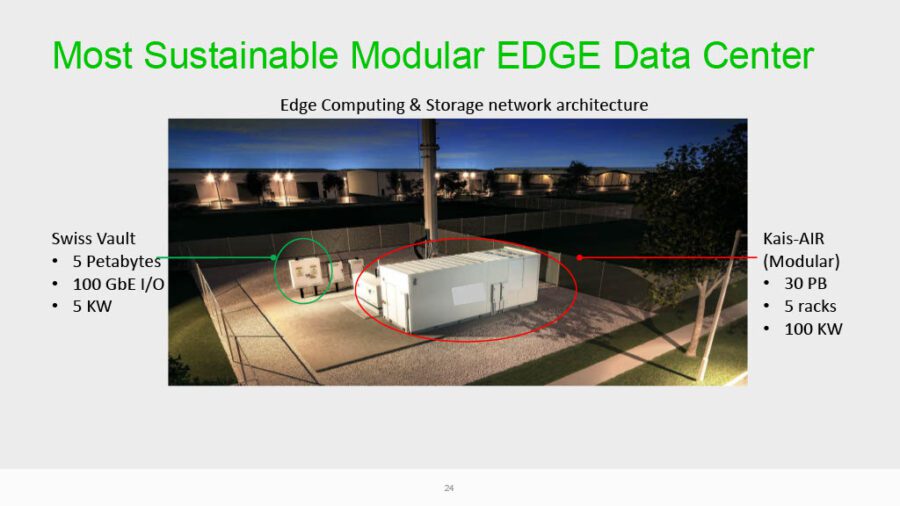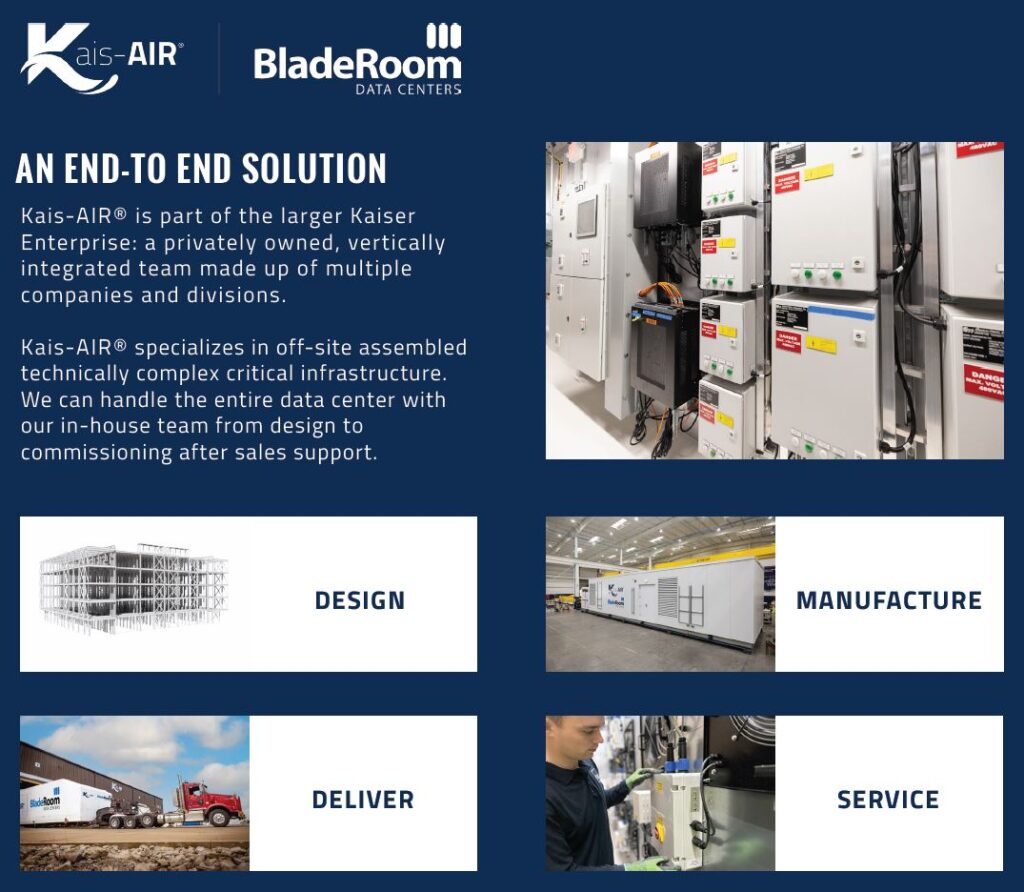Webinar with: Kais-AIR & Swiss Vault

The rapid growth of artificial intelligence has forced organizations to reconsider where their data lives and how their infrastructure operates. I have spent the past several years at the intersection of AI, sustainability, and data infrastructure. During that time I have seen cloud-first strategies begin to fail under the weight of real operational demands.
AI workloads require predictable costs. They require low latency. They require strict control over privacy, compliance, and sovereignty. They also require physical and energy efficient environments that support AI at scale.
This shift has pushed organizations back toward the edge. It has also revealed a new class of modular and sustainable infrastructure that makes on-premise AI practical again.
Our webinar panel included:
- Bhupinder Bhullar, CEO of Swiss Vault.
- Paul Costanzo, Global Data Center Solutions Leader at Kais-AIR.
- Joe Suppers, Founder of NODECOM.
Their combined work demonstrates how modular design, efficient storage, and advanced engineering can create a strong foundation for sovereign and cost efficient AI.
The shift from cloud dependence to edge deployment
I opened the webinar by discussing the strain AI places on traditional cloud environments. Many organizations now face rising egress costs, unpredictable performance, and increased security concerns. Latency and cloud outages have become common issues. At the same time, new regulations are enforcing local data requirements.
During our discussion, Joe summarized this shift clearly:
“There is a need for data centers everywhere. Hyperscale facilities are growing but companies also need infrastructure closer to their end users.”
Joe then described how AI has accelerated this need. Cloud environments charge heavily for the constant data movement required for training and inference. This has pushed many organizations away from cloud-first strategies and into an AI-first strategy that includes bringing data back on-premise.

Kais-AIR: Modular data centers built for speed and efficiency
Swiss Vault first connected with Kais-AIR when searching for data center infrastructure that could support large datasets at the edge. Kais-AIR produces modular data centers that arrive fully engineered and validated. They are built indoors at their Michigan facility. This eliminates weather delays and construction uncertainty. They also avoid concrete and reduce embodied carbon.
Bhupinder explained the advantage:
“If a hospital wants to launch AI services this year they can be up and running in six months. A traditional data center may require several years and may also face multi-year electrical delays.”
Paul described Kais-AIR’s design philosophy in very direct terms:
“We break a data center into modular components. Clients place these modules wherever they need them. They can be parking lots, fenced service areas, or remote locations.”
Kais-AIR modules range from 40 kilowatts to 350 kilowatts for air-cooled configurations. Liquid cooling can also be added. A module has been shipped to Africa to support a research university and drone fleet management. These modules can be shipped as a single unit or separated into sections for unique logistics.
Paul also emphasized the importance of flexible power and jurisdictional placement:
“We have designed units for clients who need 40 kilowatts in remote locations. They want these facilities in their own nations or their own states when the cloud is not a complete solution for them.”
This has made Kais-AIR a strong fit for governments, hospitals, universities, and telecom providers that require fast deployment and sovereign control.
Swiss Vault: Mathematical optimization for high-density storage
Swiss Vault provides the data layer required for efficient AI workloads. Data growth is increasing at approximately thirty percent per year. Traditional storage replication often creates a two hundred percent hardware overhead. This significantly increases costs and energy consumption.
Swiss Vault addresses this with a combination of erasure coding and ultra low power hardware.
Reduced data bloat
VaultFS, the Swiss Vault file system, divides files into many small data and parity shards. This creates resilience without requiring duplicate copies. Bhupinder explained the outcome:
“One petabyte of data traditionally requires three petabytes of storage. With VaultFS the same file can be stored with only five percent overhead.”
VaultFS also enables parallel access across many servers. This increases data throughput and supports GPU training, inference, genome processing, and other high bandwidth workloads.
Swiss Vault demonstrated geographic resilience using Seattle, Phoenix, New York, and London. None of the sites stored a complete file. Any site could be lost while maintaining data availability from the remaining sites.
Ultra low-power storage hardware
Swiss Vault’s storage servers consume approximately one hundred watts per server. Three servers can store one petabyte at approximately three hundred watts. Lower power usage results in lower heat output. This reduces cooling requirements inside any Kais-AIR module.
The storage hardware is also nearly silent. This makes it suitable for indoor use and consolidates well into micro data center environments.

Expanding enterprise storage through SMR drives
Swiss Vault also enables the use of shingled magnetic recording drives within enterprise environments. SMR drives offer twenty to thirty percent more capacity. However most file systems cannot manage their specific write behavior.
VaultFS supports SMR seamlessly. It also supports NVMe, SATA, SSD, and traditional platter drives. This allows operators to select the most cost effective storage media without restrictions. The ability to scale drive density without expanding physical space is especially valuable within modular micro data centers.
Securing data and maintaining sovereignty
Many industries must comply with strict data sovereignty rules. Healthcare organizations, financial institutions, and government agencies cannot allow sensitive data to be used in external AI models. They also cannot risk outages or loss of access when cloud systems fail.
Bhupinder described this clearly:
“Once your data enters an external AI model it remains there permanently. Sovereignty is essential.”
Kais-AIR provides the physical environment for sovereign AI. Swiss Vault provides the data management platform. Their combined solution allows training, inference, and long-term storage to remain on-premise. This protects privacy, ensures compliance, and gives organizations permanent control of their most valuable data assets.
A practical path toward efficient AI infrastructure
Inference has become the dominant AI workload for most organizations. Training requires large GPU clusters but occurs less frequently. Inference runs continuously and benefits from efficient hardware that consumes less power. Modular on-premise environments are well suited for this form of continuous AI operations.
Many organizations are now moving to hybrid models. Training may occur in the cloud when needed. Inference and storage remain on-premise. Kais-AIR and Swiss Vault are designed with this exact pattern in mind.
Joe summarized the value of this combined solution:
“We want organizations to regain control of their data. We also want to make the process simple. Many companies are overwhelmed by infrastructure decisions. Our combined approach makes it approachable and achievable.”
Paul also noted that strong industry alliances reduce the complexity for the customer. Instead of coordinating multiple vendors across facilities, compute, storage, and power systems, a unified offering allows organizations to deploy AI infrastructure quickly and with confidence.
Closing thoughts
The future of AI infrastructure will depend on solutions that are sustainable, efficient, and sovereign. Cloud services will continue to play a role. However many organizations now recognize that a significant portion of their AI workloads must live closer to home.

Kais-AIR and Swiss Vault both provide advanced physical infrastructure designed for efficient, sustainable, and sovereign AI operations. Kais-AIR delivers modular, prefabricated data centers that support rapid deployment, while Swiss Vault provides high density, ultra low power storage systems optimized for modern data growth. Together these technologies form a practical and scalable foundation for on-premise AI.
AI requirements are accelerating across every sector. Now is the time for organizations to evaluate how they will support this growth. Sustainable, locally controlled infrastructure is becoming a strategic necessity rather than an option. Those who modernize early will reduce operational risk, gain cost stability, and position themselves to take full advantage of AI’s next phase.
For more information contact:
Kais-AIR: [email protected]
Swiss Vault: [email protected]
Join us as we continue to explore the cutting-edge of AI and data science with leading experts in the field. Subscribe to the AI Think Tank Podcast on YouTube. Contact Us.

